Local
4 marriage ballot fights and 4 big wins
Advocates confident of sweep in Md., Maine, Minn., Wash. battles
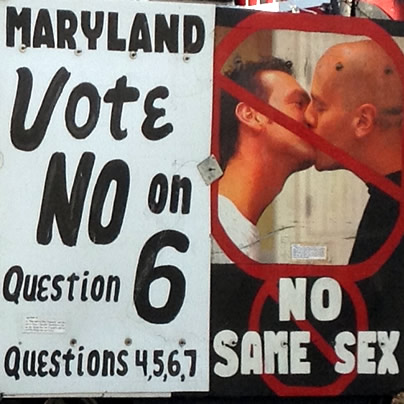
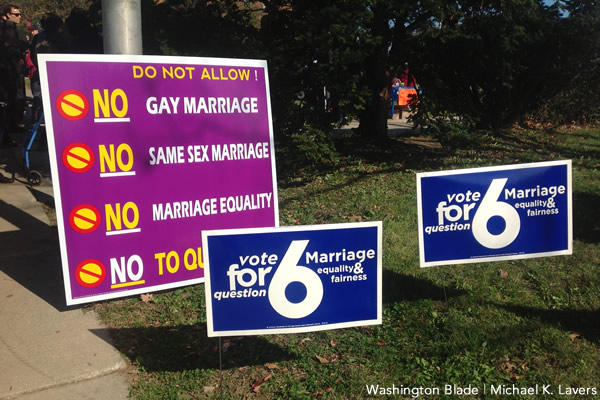
Question 6 supporters and opponents placed signs outside a polling place at Northwood Elementary School in Baltimore on Nov. 6. (Washington Blade photo by Michael K. Lavers)
Advocacy groups across the country on Tuesday celebrated the passage of two state same-sex marriage referenda and the defeat of a proposed constitutional amendment that would have banned nuptials for gays and lesbians in another.
Maryland voters supported Question 6 by a 52-48 percent margin, while Maine’s Question 1 that will allow gays and lesbians to legally marry in the state passed with 52 percent of the vote. Washington’s Referendum 74 that would uphold the state’s same-sex marriage law remains ahead by a 52-48 percent margin with what Washington United for Marriage estimates as 60 percent of the ballots counted as of deadline.
Minnesotans narrowly defeated a proposed state constitutional amendment that would have defined marriage as between a man and a woman by a 51-48 percent margin.
“Years from now we’ll remember this Election Day as the most important and the most historic in the history of the LGBT movement,” said Chad Griffin, president of the Human Rights Campaign, in a video message. He noted HRC contributed $20 million over the last two years to the four statewide same-sex marriage campaigns. “We’ve won a landslide victory at the ballot box. We’ve secured the first ever electoral victory for marriage equality in Maine, Maryland and Minnesota. And we’re optimistic about the results still to come in Washington state.”
Freedom to Marry gave $4.6 million to the four statewide same-sex marriage campaigns. It helped raise another $2.4 million to support public education campaigns in Maine, Maryland, Minnesota and Washington.
Evan Wolfson, president of Freedom to Marry, categorized the election results to the Washington Blade as “irrefutable momentum in favor of the freedom to marry” that will give “enormous confidence” to lawmakers and others to support nuptials for gays and lesbians. Casey Pick of Log Cabin Republicans further described the election results as a “turning point.”
“It is something the nation will take notice of,” she told the Blade from Maine where she had been working with Mainers United for Marriage in support of Question 1 for the last two weeks. “Never again will opponents of marriage equality be able to say that every time the people vote on the issue they favor marriage as one man and one woman because that’s no longer true.”
LGBT advocates in other states where voters did not consider same-sex marriage ballot measures also noted the historic results.
“For all of the families in Maine and Maryland, where voters upheld the rights of same-sex couples to wed, MassEquality is pleased that they will soon experience what we have celebrated for eight years now in Massachusetts: families that are stronger and communities that are healthier because LGBTQ individuals and their families are treated with dignity and fairness,” said Kara Suffredini, executive director of MassEquality, in a statement. She noted nearly 20,000 gay and lesbian couples have married in Massachusetts since the commonwealth’s same-sex marriage law took effect in May 2004. “Our rights should never be determined by a majority vote. But the wins in Maine and Maryland, as well as the defeat of a proposed anti-marriage Constitutional amendment in Minnesota, are definitive proof that there is a growing majority in America that supports our rights, and that equality wins, including at the ballot box.”
Equality Illinois CEO Bernard Cherkasov also noted the historic election results after Maine’s Question 1 passed.
“The ballot box victory is the latest evidence that the tide has turned and that momentum is on the side of full LGBT equality,” he said. “We now have a president who ran on support for marriage equality, a Democratic Party that included a marriage plank in the party platform, seven states, including Maine, and also the District of Columbia where same-sex couples can marry.”
Minneapolis resident Kirsten Olson and her partner of 18 years, Karen Hogan, a librarian at Quatrefoil Library in nearby St. Paul, waited for the Amendment 1 results at home. She awoke both Hogan and their 11-year-old daughter around 1:45 a.m. when she finally heard the proposal had failed.
“Public radio went to the victory speech that I didn’t think I would hear uttered,” said Olson as she became emotional. “It was just completely surreal and then on Minnesota Public Radio they were also talking about how the Minnesota House and the Minnesota Senate have both gone Democratic and that our governor, Mark Dayton, had on his agenda to legalize same-sex marriage. So in the span of 12 hours we went from the very real possibility of a constitutional amendment to a very real possibility of legalization.”
An ABC News/Washington Post poll conducted after President Obama endorsed marriage rights for same-sex couples in May found 53 percent of Americans supported nuptials for gays and lesbians, compared to only 36 percent in 2006. Even among social conservatives, the issue seems to have less resonance.
Only 19 percent of those who took part in a straw poll at the annual Conservative Political Action Committee conference in D.C. in February cited the promotion of “traditional values” as the most important issue going into the election. Only one percent who took part in the 2011 CPAC straw poll said stopping same-sex marriage was their top priority.
“Obviously we are very disappointed in losing four tough election battles by narrow margins,” said National Organization for Marriage President Brian Brown in a statement.
NOM contributed more than $5.5 million to oppose same-sex marriage referenda in Maine, Maryland and Washington and support Minnesota’s proposed constitutional amendment to ban nuptials for gays and lesbians. Brown conceded supporters and opponents of these respective ballot measures outspent those who opposed marriage rights for same-sex couples by at least a four-to-one margin.
He also downplayed the idea the election results are what he described as a “changing point in how Americans view gay marriage.”
“Though we are disappointed over these losses, we remain faithful to our mission and committed to the cause of preserving marriage as God designed it,” said Brown. “Marriage is a true and just cause, and we will never abandon the field of battle just because we experienced a setback. There is much work to do, and we begin that process now.”
Wolfson dismissed the remarks.
“It’s been clear for some time that they lost the argument,” he told the Blade. “All they have is scare tactics, diversions and some raw power in being able to throw money and mobilize some people — a dwindling number. They’re going to keep at it. That’s where their livelihood is. They know they’re losing. They know they’re on the wrong side of history. The opposition will continue, but we are winning.”
Pick said she feels the election results send a message to GOP lawmakers who continue to oppose marriage rights for same-sex couples.
“Log Cabin Republicans have been saying for a long time that the tide is turning on this issue,” she said. “For our party it is incumbent upon us to recognize that inclusion is the way of the future. And to be victorious and to win future elections with voters who are taking their place as the majority of the populace today, marriage equality has to be a part of that formula.”
Back in Maryland, there was a palpable sense among those awaiting the Question 6 results at a Baltimore concert hall the Free State was about to make history as the first state to approve same-sex marriage at the ballot.
Lesbian state Del. Heather Mizeur told the Blade before Marylanders for Marriage Equality announced the referendum had passed she feels Obama’s support of same-sex marriage had a tremendous impact in Maryland.
“While we already felt very confident where we were headed in this campaign, he stood up and did something no president has ever done for our community and help make it okay for all of our allies to be comfortable with being public about what their position was about equality,” she said. “We started to see the numbers very strongly in our direction after he came out in favor of it. And that’s why we’re hoping for a double win tonight and celebrating our marriage equality and also sending this courageous president back for another four year term.”
Olson said most of her friends, family and neighbors understand Minnesota voters made history by striking down the proposed amendment.
“People totally understand that, totally feel that,” she said. “There are obviously 49 percent of the population — or 48 percent I guess is what it finally came out to be who think otherwise, but they’re not 50 percent plus one.
Shaun Knittel, executive director of the pro-Referendum 74 group Social Outreach Seattle, told the Blade he feels this sense of history prompted a lot of young first-time voters to go to the polls and support the law.
“Nov. 6, 2012, is going to be a historic day for the gay community, the LGBTQ community because this is the time we stopped the bigots,” he said. “It’s the first time it has happened in this way and it was such a big statement. It wasn’t just one state or one group that just seemingly got lucky. It was four states involved in this.”
District of Columbia
Imperial Court of Washington drag group has ‘dissolved’
Board president cites declining support since pandemic
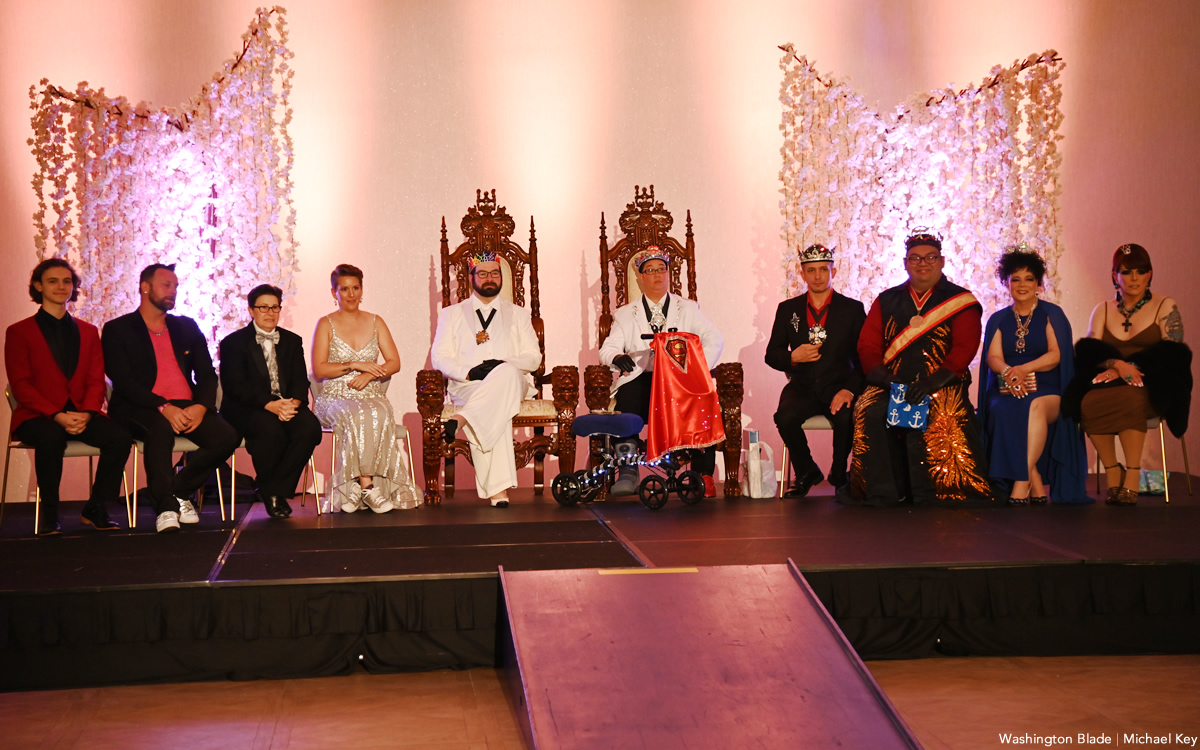
The Imperial Court of Washington, a D.C.-based organization of drag performers that has raised at least $250,000 or more for local LGBTQ and non-LGBTQ charitable groups since its founding in 2010, announced on Jan. 5 that it has ended its operations by dissolving its corporate status.
In a Jan. 5 statement posted on Facebook, Robert Amos, president of the group’s board of directors, said the board voted that day to formally dissolve the organization in accordance with its bylaws.
“This decision was made after careful consideration and was based on several factors, including ongoing challenges in adhering to the bylaws, maintaining compliance with 501(c)(3) requirements, continued lack of member interest and attendance, and a lack of community involvement and support as well,” Amos said in his statement.
He told the Washington Blade in a Jan. 6 telephone interview that the group was no longer in compliance with its bylaws, which require at least six board members, when the number of board members declined to just four. He noted that the lack of compliance with its bylaws also violated the requirements of its IRS status as a nonprofit, tax-exempt 501(c) (3) organization.
According to Amos, the inability to recruit additional board members came at a time when the organization was continuing to encounter a sharp drop in support from the community since the start of the COVID pandemic around 2020 and 2021.
Amos and longtime Imperial Court of Washington member and organizer Richard Legg, who uses the drag name Destiny B. Childs, said in the years since its founding, the group’s drag show fundraising events have often been attended by 150 or more people. They said the events have been held in LGBTQ bars, including Freddie’s Beach Bar in Arlington, as well as in other venues such as theaters and ballrooms.
Among the organizations receiving financial support from Imperial Court of Washington have been SMYAL, PFLAG, Whitman-Walker Health’s Walk to End HIV, Capital Pride Alliance, the DC LGBT Community Center, and the LGBTQ Fallen Heroes Fund. Other groups receiving support included Pets with Disabilities, the Epilepsy Foundation of Washington, and Grandma’s House.
The Imperial Court of Washington’s website, which was still online as of Jan. 6, says the D.C. group has been a proud member of the International Court System, which was founded in San Francisco in 1965 as a drag performance organization that evolved into a charitable fundraising operation with dozens of affiliated “Imperial Court” groups like the one in D.C.
Amos, who uses the drag name Veronica Blake, said he has heard that Imperial Court groups in other cities including Richmond and New York City, have experienced similar drops in support and attendance in the past year or two. He said the D.C. group’s events in the latter part of 2025 attracted 12 or fewer people, a development that has prevented it from sustaining its operations financially.
He said the membership, which helped support it financially through membership dues, has declined in recent years from close to 100 to its current membership of 21.
“There’s a lot of good we have done for the groups we supported, for the charities, and the gay community here,” Amos said. “It is just sad that we’ve had to do this, mainly because of the lack of interest and everything going on in the world and the national scene.”
Virginia
LGBTQ groups to join Spanberger inaugural parade
Virginia Pride among more than 25 orgs to march in Jan.17 event
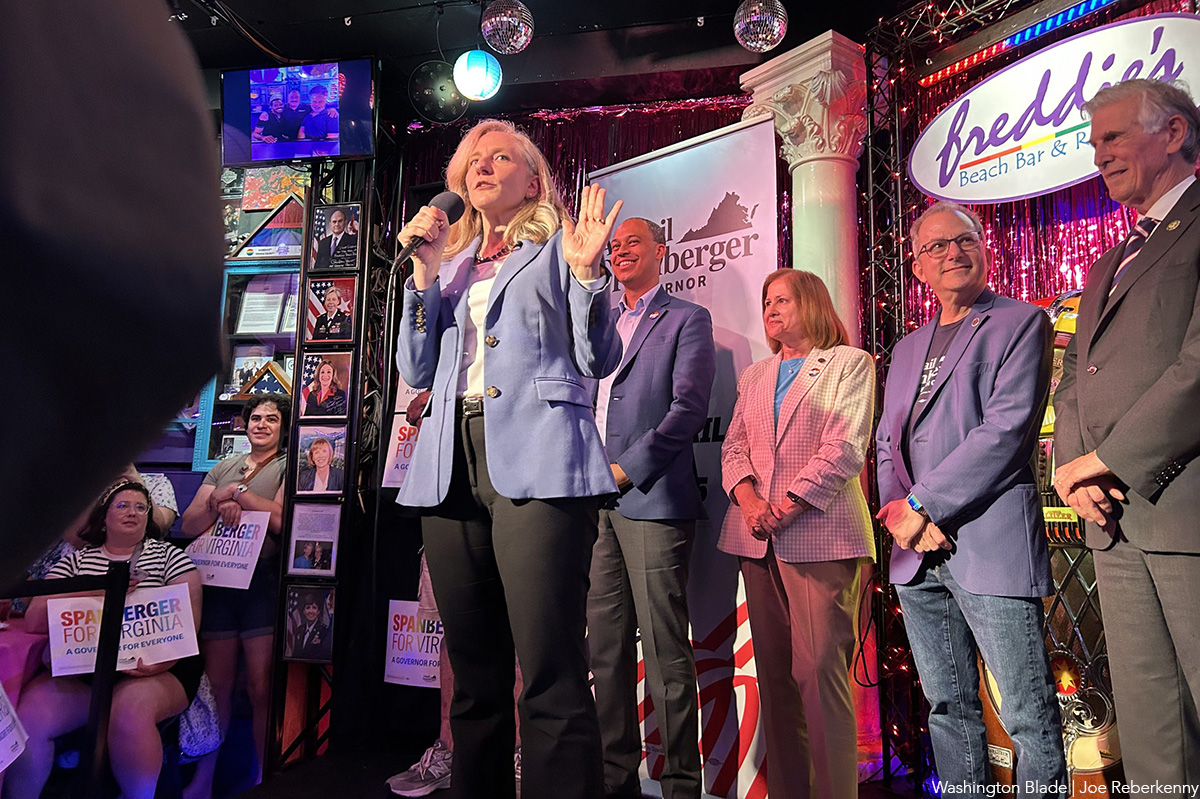
Virginia Gov.-Elect Abigail Spanberger’s inaugural committee announced on Jan. 2 that at least two LGBTQ organizations will be among more than 25 state-based organizations, including marching bands, that will participate in her inaugural parade on Jan. 17.
A statement released by the inaugural committee says the parade will take place immediately after Spanberger is sworn in as Virginia’s 75th governor and delivers her inaugural address in Richmond.
The statement lists the LGBTQ groups Virginia Pride and Diversity Richmond as two groups participating in the parade, although the two groups merged in 2021, with Virginia Pride becoming a project of Diversity Richmond. Among other things, Virginia Pride organizes Richmond’s annual LGBTQ Pride events.
“A display of the impressive talent and beauty of every corner of Virginia, our inaugural parade will be a celebration of all that makes our Commonwealth strong,” Spanberger said in the Jan. 2 statement. “I’m excited for attendees in the stands on Capitol Square and families watching together at home to see this incredible showing of Virginia pride,” she said.
James Millner, who serves as director of Virginia Pride, told the Washington Blade about 75 people are expected to join the Virginia Pride-Diversity Richmond contingent in the parade. He said among them will be members of other Virginia LGBTQ organizations.
“We’re going to invite our staff, our board, our volunteers, and our community partners to join us,” Millner said.
“We are thrilled and honored to have been invited to participate in Abigail Spanberger’s inauguration festivities,” he added. “I think this represents a marked change from the previous administration and demonstrates what she campaigned on – which is she sees the diversity of the Commonwealth as a strength that needs to be celebrated,” he said. “And we are very happy that she has invited us to represent the diversity of the commonwealth.”
Millner appeared to reflect on the sentiment of the large majority of Virginia’s LGBTQ community in its support for Democrat Spanberger over Republican Lt. Gov. Winsome Earle-Sears in the November 2025 Virginia election and the end of incumbent GOP Gov. Glenn Youngkin’s term in office on Jan. 17.
“After what we’ve been through with the Younkin administration, especially in its treatment of LGBTQ folks, especially transgender and nonconforming folks, I think we are all breathing easy and excited about what opportunities will exist in working with Abigail Spanberger,” he told the Blade.
District of Columbia
Two pioneering gay journalists to speak at Thursday event
Blade’s Chibbaro, Falls Church News-Press’s Benton talk long careers
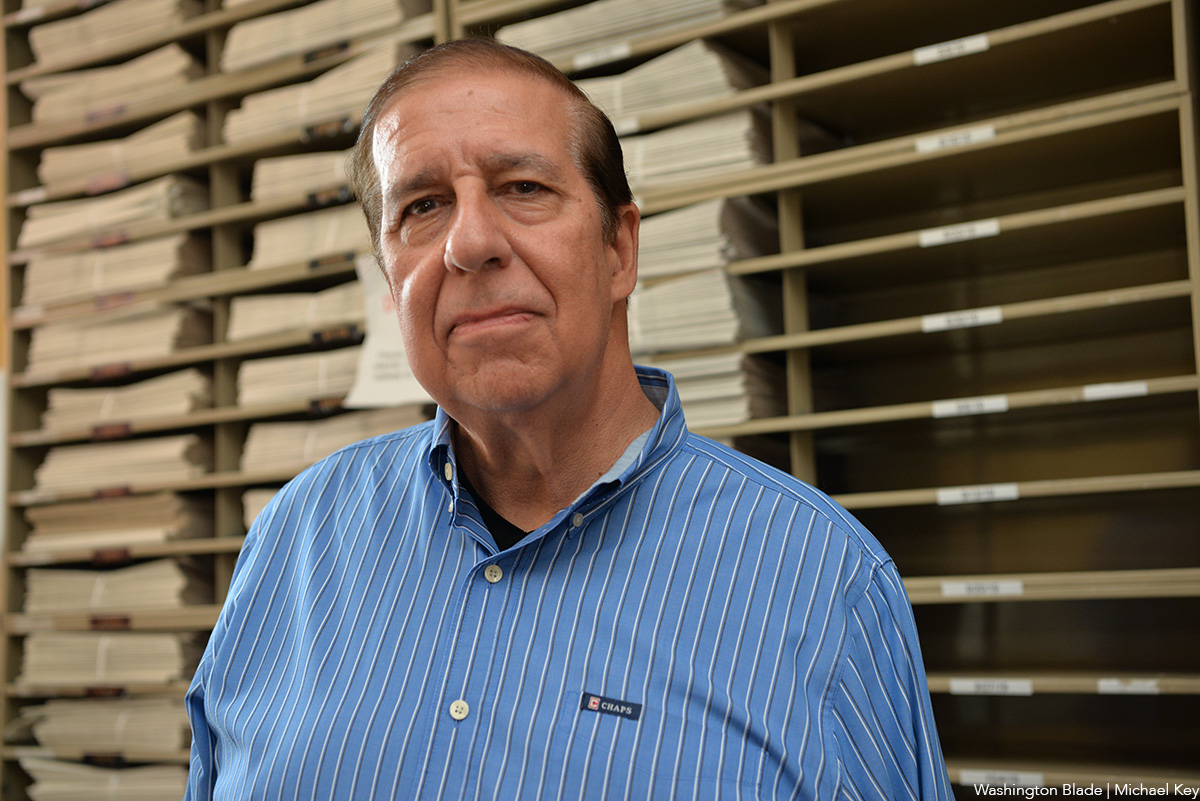
Two local gay journalists will speak on a panel this week about their long, pioneering careers.
A celebration of the Falls Church News-Press’s Nicholas Benton and the Washington Blade’s Lou Chibbaro Jr., two trailblazing LGBTQ journalists who have spent decades reporting on the front lines of social, cultural, legal, and political change in America, will be held this Thursday, Jan. 8, at the Women’s National Democratic Club of Washington. D.C., 1526 New Hampshire Avenue, N.W., at 6 p.m., according to a statement from organizers.
The program will explore their journeys, the evolution of LGBTQ journalism, and the ongoing fight for equality and justice. Benton and Chibbaro will also examine the various factors causing many news outlets to cease print publication and their energetic efforts to continue publishing their work both in print and online.
EVENT DETAILS:
- Remarks and Q&A, in-person and via Zoom.
- 6 p.m. complimentary hors d’oeuvres and cash bar; 6:30–7:30 p.m. program followed by book signing.
- Zoom only: $10. In-person: members: $20, nonmembers: $30 plus tax.
Benton’s latest book, “Please Don’t Eat Your Children, Cult Century, and Other Essays,” will be available for purchase at the event.
Benton is a longtime local journalist and LGBTQ rights activist whose work has had a lasting impact on both community journalism and social justice. Author of the first-ever editorial in the pioneering Gay Sunshine newspaper in 1970, he is best known as the founder, owner, and editor of the Falls Church News-Press, an independent weekly newspaper he launched in 1991 and is the paper of record for the City of Falls Church, Virginia.
Chibbaro is the senior news reporter for the Washington Blade and a pioneering journalist in LGBTQ news coverage. He has reported on the LGBTQ rights movement and community continuously since 1976, first as a freelance writer and later as a staff reporter, joining the Blade in 1984.



















